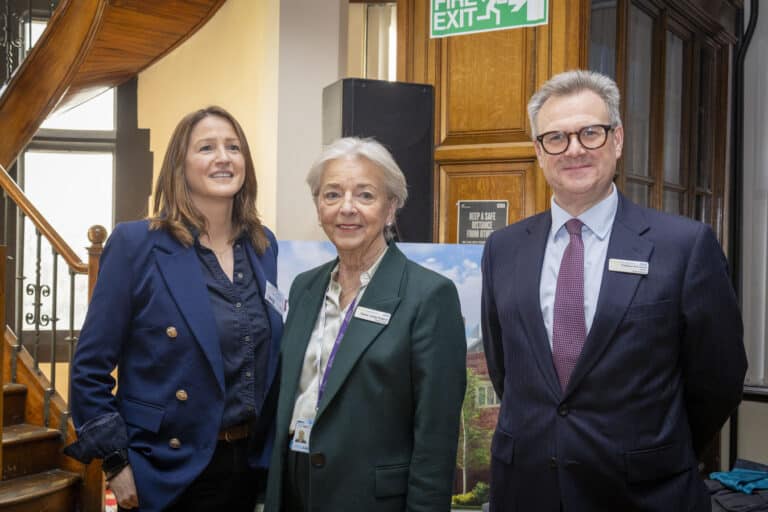Leeds’ historic Old Medical School is to be redeveloped into a cutting-edge Health Tech Innovation Hub which will cement Leeds as a leading centre for researchers, businesses and clinicians to accelerate the next generation of medical breakthroughs, according to a senior NHS leader.
Professor Phil Wood, Chief Executive at Leeds Teaching Hospitals NHS Trust, was speaking at a landmark event hosted at the Old Medical School during the West Yorkshire Innovation Festival. He described the project as “a real once-in-a-generation opportunity for the city of Leeds and for the region to really drive forward health innovation and meet the needs of our population”.
The Old Medical School, which was completed in 1894, will be transformed as part of the Leeds Innovation Village project. Professor Wood explained that innovations from the hub would help shape the design and functionality of future healthcare facilities at the planned new hospital at Leeds General Infirmary.
Deb Hetherington, director of innovation ecosystems at developer Scarborough Group International (SGI), outlined the vision for the hub, emphasising that “physical spaces for innovation remain important even in a post-COVID, super-connected world where you can work from home”.
She said: “Scarborough Group absolutely understands that the bricks and mortar are by no means the most important element to creating high-performance innovation ecosystems. We will build world-class facilities here – dry labs, wet labs, offices, incubator space, collaboration space and beyond. We’ll also design spaces where innovative businesses will come together around the water cooler.”
Hetherington added that “modern innovation is about open innovation rather than the old model of isolated science parks with big walls hiding secrets,” and highlighted the “triple helix model of innovation” that would drive success at the hub, bringing together SGI, local government, and knowledge centres like the Trust and university partners.
“The absolute exceptional part of being involved in this project in Leeds is that all of those things are already there as building blocks, and there is a huge appetite for collaboration across those entities,” she said, citing research showing that “designed innovation spaces can be up to 25 per cent more productive than non-designed city counterparts (Catapult, 2024)”.
Mayor of West Yorkshire Tracy Brabin, who attended the event, highlighted the hub as one of the flagship projects in the West Yorkshire Investment Zone that will “highly benefit the West Yorkshire region”. She emphasised that innovation is essential for regional growth: “If growth is the exam question, then innovation surely is the answer, because you can’t keep doing what you’ve already done if you want to grow the economy.”
The Mayor also highlighted the pressing need to address health inequalities: “We know here in West Yorkshire, we have health inequality that is unacceptable, that a child born today in Ilkley could potentially live ten more years of healthy life than a child born today in Dewsbury or Batley. We cannot accept that. That is why we need that health innovation.”
Brabin noted that West Yorkshire already has “a thriving health and life sciences sector ecosystem in place… made up of more than 300 health tech firms centered on digital health, medical devices and diagnostics… generating around £3bn a year in revenue”.
The 75,000 sq ft Grade II-listed building will be designed to support health tech innovation activity at the Trust, building on the success of the Innovation Pop-Up. It will bring together start-ups, established industry players, academic institutions, and community organisations under one roof. The facility will include co-working spaces, meeting rooms, event areas, offices and laboratories, serving as a catalyst for collaboration to advance scientific research into practical healthcare solutions, driving economic growth and improving patient care.
The event showcased the collaborative ecosystem already forming, with attendance from innovative start-ups, global healthcare companies, and visitors from Vanderbilt University and Nashville, Tennessee – new trade partners for the region.










